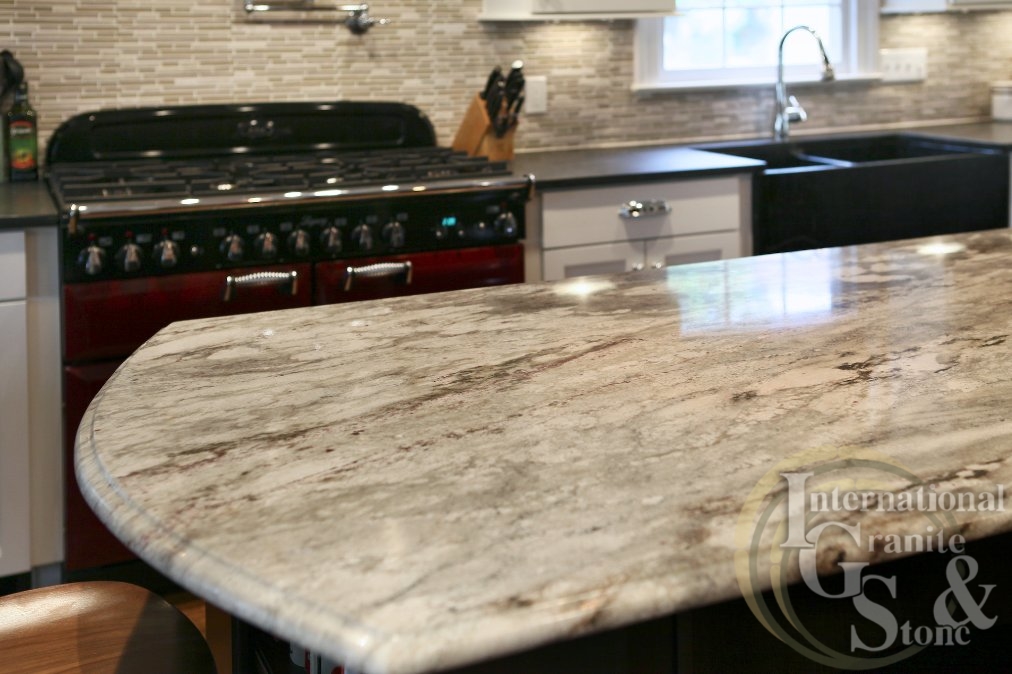
Originally thought to be a fad – a short-lived flash in the pan – granite vanity tops have now become a mainstay in American bathrooms and kitchens. Along with stainless steel appliances, they’ve almost become a prerequisite in the real estate industry. If your prospective home doesn’t have granite? Forget about it.
In fact, the amount of money U.S. homeowners have spent on granite since the late 1990s is more than it cost to expel Sadam Hussein from Kuwait! The granite takeover has been astounding.
Over this period of time, however, an archive of myths have been built around granite and many questions have been left unanswered. If you’re considering adding granite vanity tops to your home, you need the facts.
Below are answers to granite’s most pressing questions.
What Exactly Is Granite?
Granite is a light-colored igneous rock that forms from the slow crystallization of magma below Earth’s surface. Granite is composed of a variety of different rocks and minerals like quartz, feldspar, and mica.
Also, a fun fact for the Winter Olympics fans out there: curling stones are traditionally made with granite.
What Is the Difference Between Granite and Quartz?
Naturally, you might be thinking that since granite is made up of (at least partly) quartz, what is the difference between the two?
Well, granite is 100% natural. The rock mined from the earth is exactly the rock that ends up on your counter.
Quartz, on the other hand, has to be bound together with manmade resins and polymers to be formed into slabs. These resins often contain chemicals that emit air pollutants called volatile organic compounds, or VOCs. If you’re concerned about indoor air quality, granite is definitely the way to go.
Are Granite Vanity Tops Heat Resistant?
There has been a growing suspicion among certain folks that granite vanity tops are somehow delicate, requiring tender care and safeguarding against heat and daily wear-and-tear. Since granite is primarily going to be the surface used in your kitchen, it’s smart to be wary about this sort of thing.
It is, however, completely untrue. Just thinking about how granite was formed in the Earth: With magma. Granite is about the most heat resistant a kitchen counter material you could find. Placing a hot pot on the counter won’t cause it to chip, warp, or crack. You’d really have to light the stuff on fire to do any serious damage.
Do Granite Countertops Stain Easily?
Generally speaking, granite vanity tops are pretty resistant to stains – at least as resistant as any other countertop material. Most liquids will not stain and will more likely evaporate before leaving a permanent mark on your granite counters.
Granite, however, is a rock, which means that it is at least a little porous. Certain oils, if left completely unattended, can soak into the rock. As long as you’re cleaning your counters, regularly, though, this won’t be a problem.
Do Granite Countertops Require a Lot Of Maintenance?
Granite vanity tops require as much maintenance as any other countertop, which is to say: Not a lot. A routine cleaning with a simple soap-and-water solution is all a granite countertop needs on a regular basis.
The only special attention granite needs is an annual application of a penetrating sealer, which usually doesn’t take more than a couple of minutes.
How Are Granite Countertops Installed?
Installing granite countertops is not a very DIY-friendly task. The process has many steps and materials needed and requires an expert level of technical ability. On top of that, granite weights 19 lbs. per square foot, so if you’ve got a large kitchen, you’ll need a team to do some heavy lifting.
With an expert, the first step is, typically, to take precise measurements of your kitchen counter-space, taking into account how much granite overhand you’d like. Once your kitchen’s measurements have been taken, you order the required amount of granite in the style you’d like.
Then, your contractor will cut out 3/4″ plywood slabs and place them on your kitchen counters to serve as a base for the granite.
Once the plywood is down, the contractor will then cut the granite to fit your counters and place them on the counters to make sure everything fits right.
After that, the granite is glued down to the plywood by placing beads of silicone glue around the perimeter of the plywood to get a tight seal. Also, areas like the sink are caulked to further waterproof the seal.
Lastly, in places where the “seams” of two different granite slabs meet, more glue (with added color to match the granite) is placed on the seams.
How Expensive Is Granite?
Cost is always relative. Granite is often as costly or cheaper than other luxury countertop surfaces like quartz or marble. Granite will run you about $60 per square foot in just raw materials, which sounds like a lot but compared to the $95 per square foot it cost in the 90s, it’s quite a reduction.
And again, compared to the cost of marble of quartz, it is the same or lower.
Of course, you have to factor in installation costs, so you should get a quote from a professional before you begin ballparking the costs.
Thinking About Adding Granite To Your Home?
Granite is a fantastic way to add an immediate wow-factor to the interior of your home. And thanks to its heat and stain resistant properties, they also provide an upgrade in utility compared to your vinyl or tile countertops.
On top of all that, they also provide an immediate boost to the value of your home, since the material is such a hot commodity on the real estate market.
If you’re thinking about updating your kitchen countertops with granite, consider giving contacting us for a free in-home consultation. We’ve got the skill and expertise to get you the granite countertops of your dreams.

